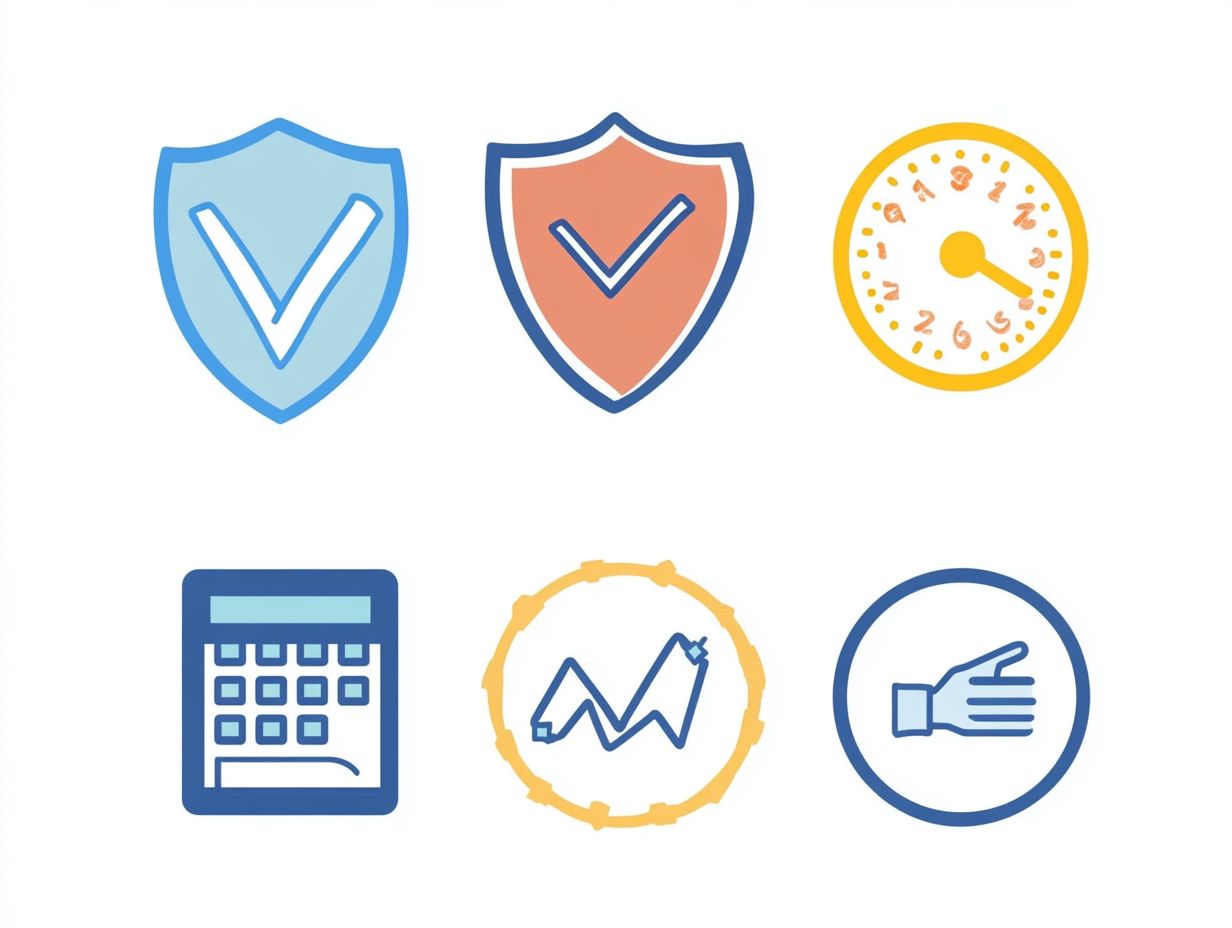5 Factors Influencing Freelancer Insurance Rates
Navigating the world of insurance can be quite a challenge for freelancers like you, who often encounter unique risks and uncertainties.
Understanding the factors that influence insurance rates is crucial for securing the best coverage at an affordable price. This article delves into five key elements that significantly impact insurance costs, including your age, health, the type of coverage you need, and your location.
It also addresses common risks freelancers face, offers tips for improving credit scores, and shares strategies for saving money on insurance. With this knowledge in hand, you can make informed decisions that effectively protect both your work and your finances.
Contents
- Key Takeaways:
- 1. Age and Health Status
- 2. Type of Insurance Coverage
- 3. Location and Cost of Living
- 4. Industry and Risk Factors
- 5. Claims History and Credit Score
- What Are the Different Types of Insurance Coverage for Freelancers?
- How Can a Freelancer Determine the Right Insurance Coverage for Them?
- What Are the Most Common Risks and Hazards Faced by Freelancers?
- How Can a Freelancer Improve Their Credit Score to Get Better Insurance Rates?
- What Are the Factors That Insurance Companies Consider When Setting Rates for Freelancers?
- How Can a Freelancer Save Money on Insurance Rates?
- Frequently Asked Questions
- What are the 5 factors that influence freelancer insurance rates?
- How does age affect freelancer insurance rates?
- Why does health impact freelancer insurance rates?
- Does occupation play a role in freelancer insurance rates?
- How does location affect freelancer insurance rates?
- What is the significance of coverage level in determining freelancer insurance rates?
Key Takeaways:

- Younger and healthier freelancers often enjoy lower rates!
- Choosing the right type of insurance coverage can affect your rates significantly!
- Location and cost of living can lead to higher rates for freelancers in certain areas!
1. Age and Health Status
Your age and health status are important for deciding your insurance needs. These factors significantly influence both the premium costs and the types of coverage options available to you in the insurance marketplace, especially for freelancers working in the gig economy (a job market characterized by short-term contracts and freelance work).
Understanding how your age impacts health insurance premiums is vital. If you’re on the younger side, you re likely to enjoy lower premiums due to a generally reduced likelihood of serious health issues. On the other hand, if you re older, be prepared for higher costs, as chronic conditions tend to be more common.
Take stock of your medical history, as any pre-existing conditions can further affect your premiums and the coverage options available. It’s crucial to evaluate plans tailored to your age bracket, whether they offer specialized benefits for older freelancers or cater to younger professionals with fewer health concerns. Additionally, exploring freelancer insurance options can help you make informed decisions regarding your coverage.
Risk assessment is key. By accurately evaluating your personal health history, you can make better-informed decisions, finding a balance between your coverage needs and financial implications.
2. Type of Insurance Coverage
As a freelancer, you must navigate various types of insurance coverage. This includes essential options like liability insurance, health insurance, disability insurance, and life insurance. Understanding these options is vital for ensuring comprehensive protection against professional risks and financial obligations.
Each type serves a distinct purpose in safeguarding your career and well-being. For instance, liability insurance protects you against potential claims from clients or third parties, covering legal costs and damages if disputes arise. Additionally, exploring the top 5 insurance plans for freelancers can help ensure you have the right coverage. Health insurance is essential for managing medical expenses, especially since freelancers often lack employer-sponsored plans.
Disability insurance provides financial support if you face a temporary or long-term inability to work, offering peace of mind during unexpected health challenges. Life insurance plays a critical role in securing your loved ones’ financial future, especially if you have dependents.
By carefully assessing your freelance work and evaluating your risk exposure, you can tailor your insurance portfolio to meet your specific needs, fostering both security and stability in your professional life.
Ready to take the next step? Assess your insurance needs today or consult a professional to ensure you have the coverage you deserve!
3. Location and Cost of Living
The location you choose and the cost of living in that area have a significant impact on your insurance rates and the coverage options available to you.
These factors are crucial. They directly influence how insurance providers assess risk.
Take urban areas, for example. The higher population density often leads to an increased frequency of claims, resulting in steeper insurance costs for freelancers like you. On the flip side, if you reside in a rural region, you might encounter different hurdles, such as a limited number of insurers and fewer coverage types.
Local regulations can also have a substantial effect. Some states may require specific insurance policies, which impacts availability and costs. Additionally, you ll need to navigate regional risks, such as natural disasters in certain areas, which could demand extra coverage.
Grasping these nuances is essential for optimizing your insurance strategies to fit the unique characteristics of your geographical context.
4. Industry and Risk Factors

When considering professional risks, different industries present unique project and professional risks that you must consider when evaluating your insurance coverage and making informed decisions to protect against client disputes and potential legal claims.
For instance, if you re a freelancer in the creative sector like a graphic designer or photographer you may face risks related to copyright issues and client misinterpretations of your work. Conversely, if you re in the tech industry, such as a software developer or IT consultant, you might encounter data breaches and system failures.
Each risk needs a tailored insurance policy that addresses your industry’s challenges. Therefore, conducting a thorough risk assessment becomes a crucial step in identifying your specific needs and ensuring you select the right coverage for your unique circumstances, minimizing the likelihood of unexpected financial burdens.
5. Claims History and Credit Score
A freelancer’s claims history and credit score are essential elements that insurance providers scrutinize when determining insurance costs and rates, highlighting the necessity of building a strong financial background for the best coverage options.
This evaluation process affects your insurance costs and the types of policies you can choose from. A clean claims history signals lower risk, which can translate into more favorable rates, while a strong credit score can empower you to negotiate better rates.
You can take proactive steps to enhance your claims history by practicing diligent risk management the steps you take to avoid problems using contracts to clarify terms and staying organized to avoid misunderstandings. As for your credit score, prioritize timely payments, keep an eye on your credit reports for inaccuracies, and manage your debts wisely. This will foster a healthier financial footprint that ultimately opens the door to more advantageous insurance opportunities.
Start improving your financial habits today to unlock better insurance options!
What Are the Different Types of Insurance Coverage for Freelancers?
Freelancers have access to various essential insurance options. These can safeguard your business and maintain financial stability.
Navigating insurance can be overwhelming. Independent workers face unique challenges in a competitive market.
Understanding each policy type is crucial. For instance, liability insurance is vital for mitigating risks associated with client-related claims.
Health insurance options can provide coverage for medical expenses. Evaluating your personal circumstances and future goals empowers you to select the most suitable insurance plans.
This ensures that you maintain both your physical well-being and financial security as you grow your business.
How Can a Freelancer Determine the Right Insurance Coverage for Them?
To determine the right insurance coverage, conduct a thorough risk assessment of your business activities.
This means evaluating your specific insurance needs and making informed coverage decisions for adequate financial protection.
Start by identifying potential risks associated with your work, such as liability from client interactions or damage to your equipment.
Next, consider your ongoing financial obligations, like operational costs and personal expenses, especially in case of disruptions.
Once you have a clear picture of your needs, explore the insurance marketplace. Examine various coverage options that align with your unique situation.
By comparing policies and understanding the essential features, you can select plans that provide stability and security. This approach allows you to focus on your craft with peace of mind.
What Are the Most Common Risks and Hazards Faced by Freelancers?

As a freelancer, you encounter various common risks and hazards, such as project risks, professional risks, and client disputes.
These challenges underscore the importance of securing the right insurance policies to mitigate potential liabilities.
Navigating freelancing often means facing uncertainties that impact financial stability and professional reputation.
Project risks can emerge from tight deadlines, inadequate resources, or shifting client expectations. Having liability insurance protects you against potential claim losses.
Professional risks, such as errors or omissions in your work, highlight the need for professional indemnity insurance.
Client disputes over contract terms can be significant, reinforcing the importance of legal protection through appropriate insurance coverage.
By understanding these risks comprehensively, you can make informed decisions about your insurance needs and safeguard your future.
How Can a Freelancer Improve Their Credit Score to Get Better Insurance Rates?
Improving your credit score as a freelancer is essential for securing better insurance rates. A higher credit score can lead to significant savings on premiums.
By taking proactive measures like paying your bills on time and reducing outstanding debt you can enhance your financial standing over time.
It’s wise to routinely check your credit reports for inaccuracies; these can negatively impact your score if not addressed.
Recognizing that insurance companies incorporate credit scores into their pricing models inspires you to prioritize financial health.
A better credit score leads to lower insurance premiums, unlocking additional savings across other areas of your financial management.
Don t let risks catch you off guard! Explore your insurance options now!
What Are the Factors That Insurance Companies Consider When Setting Rates for Freelancers?
Insurance companies evaluate several factors when setting rates for freelancers. These include claims history, the type of work performed, and project assessments.
These factors directly impact risk evaluation and insurance costs. Understanding them can empower you to refine your approach and potentially lower your insurance expenses.
Maintaining a strong claims history with few or no incidents makes you more attractive to insurers. Specialized skills often come with lower rates due to perceived expertise and reduced risk.
You can engage with insurers to discuss ways to reduce risk. This strategy helps you secure competitive insurance deals and build a stronger relationship with providers.
How Can a Freelancer Save Money on Insurance Rates?
Freelancers can use various strategies to save money on insurance rates. Consider bundling your policies and seeking discounts to keep premium costs manageable while ensuring adequate coverage.
Actively comparing quotes from different providers helps you find the most cost-effective options tailored to your needs. Bundling auto and home insurance can lead to significant savings.
If you’re looking to manage healthcare costs affordably, health-sharing programs are a viable alternative. Stay alert to market changes to maximize your savings and maintain the right coverage.
Frequently Asked Questions

What are the 5 factors that influence freelancer insurance rates?
The five factors that influence freelancer insurance rates are age, health, occupation, location, and coverage level.
How does age affect freelancer insurance rates?
Age affects freelancer insurance rates because younger individuals are generally considered healthier and less risky to insure.
Why does health impact freelancer insurance rates?
Health impacts insurance rates since individuals with pre-existing conditions may require more medical care, resulting in higher costs.
Does occupation play a role in freelancer insurance rates?
Yes, occupation influences rates. Some professions carry higher risks, leading to increased insurance costs.
How does location affect freelancer insurance rates?
Location can affect rates due to varying healthcare costs and risk levels associated with certain occupations in different regions.
What is the significance of coverage level in determining freelancer insurance rates?
Coverage level is significant because higher coverage typically means higher insurance costs but also offers more comprehensive protection.






